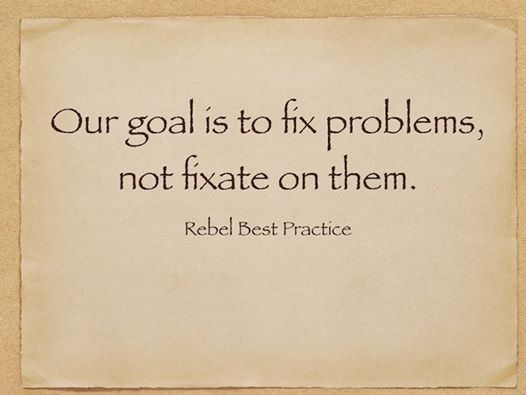 Innovation managers from two Fortune 50 companies got together a few weeks ago and the conversation devolved into just how frustrating internal barriers are to getting anything substantive done.
Yesterday nurses from a prestigious Boston hospital group talked about patient care and the conversation turned to how impossible it is to improve health care because vice presidents are making decisions without any input from the people working directly with patients. In other words, the nurses.
Innovation managers from two Fortune 50 companies got together a few weeks ago and the conversation devolved into just how frustrating internal barriers are to getting anything substantive done.
Yesterday nurses from a prestigious Boston hospital group talked about patient care and the conversation turned to how impossible it is to improve health care because vice presidents are making decisions without any input from the people working directly with patients. In other words, the nurses.
These conversations can be pretty intense. There are enormous barriers to getting things done inside large organizations.
But talking over and over again about all the obstacles, politics and bureaucracy doesn't help make anything better. Nor does it make us feel better. Dwelling on what we can't do saps us.
I asked the nurses what they had suggested to the vice presidents. In what ways could the nurses be part of the VP discussions about important decisions affecting patients?
Silence.
The nurses are so stuck in thinking that the "hierarchy is the hierarchy" that they hadn't even considered proposing possible solutions. " What if," I proposed, "you suggested that the nurses and VPs get together every three months for a session to discuss the issues and talk about different scenarios to consider? Maybe you suggest doing this type of collaborative session twice as an experiment to see if it provides more value. If it works, it continues. If it doesn't the VPs can go back to their old ways."
Wishing that things were different is a waste of time.
Similarly, one of the Fortune 50 innovation managers finally said, "Aren't we wasting time wishing things could be different. What if we recognize how it really is and work on a success plan based on that reality?"
People across industries are frustrated with how hard it is do change things at work. The opportunity for all of us is to create possible solutions -- regardless of our title or "rank" in the hierarchy -- and suggest ways to test them out.
And maybe a way to get started is to NOT to focus on "disrupt the industry, change the world, innovate the business model" kind of ideas.
Sometimes big change starts just by getting the right people together -- like hospital administrators and nurses -- to talk about the real issues.
Magical thinking may lead people to believe that their thoughts by themselves can bring about effects in the world or that thinking something corresponds with doing it.
Andrew Colman, Dictionary of Psychology
